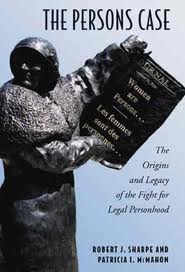by Mr. Justice Robert Sharpe of the Court of Appeal for Ontario and Prof. Patricia McMahon, Osgoode Hall Law School. Published with the University of Toronto Press, 2007.
The Persons’ Case is one of the best known Canadian constitutional cases, both for the fact that it declared women to be ‘persons’ for the purposes of eligibility for Senate appointment, and for Lord Sankey’s invocation of the living tree metaphor in interpreting the constitution. Robert Sharpe and Patricia McMahon add enormously to our understanding of the case by a detailed exploration of its context. They analyse the campaign for the recognition of women as senators in both political and legal circles, and they examine the background and personalities of the major players in the litigation, in particular Lord Sankey, Prime Minister Mackenzie King, and Emily Murphy. Murphy, one of the ‘famous five’ litigants, was the driving force behind the demand for legal recognition, and she is shown here to be a fascinating and complex individual.



